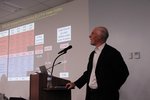Robert Cushman says Warwick needs new high schools. The city would thrive with them. But Cushman is urging voters to reject the $350 million bond referenda on the November for new Toll Gate and …
This item is available in full to subscribers.
We have recently launched a new and improved website. To continue reading, you will need to either log into your subscriber account, or purchase a new subscription.
If you are a current print subscriber, you can set up a free website account by clicking here.
Otherwise, click here to view your options for subscribing.
Please log in to continue |
|


Robert Cushman says Warwick needs new high schools. The city would thrive with them. But Cushman is urging voters to reject the $350 million bond referenda on the November for new Toll Gate and Pilgrim High Schools until the city and school administrations develop plans to pay for them without over burdening the taxpayer, potentially forcing them out of their homes.
The former member and chairman of the School Committee, who went on to be elected to the City Council, hosted a meeting last Wednesday at the Warwick Public Library under the banner of the Warwick Affordable School Act. About 100 people attended the 45-minute presentation that was followed by comments from local activist Rob Cote a certified structural inspector on major construction projects. He said with the cost of structural steel and other materials more than doubling, cost estimates for the two schools are unrealistic and that $350 million would not be enough to do the job.
Cushman argues if voters approve the $350 million bond neither the city nor the schools will make fundamental changes needed to reduce the cost of government and that taxes will increase because growth in tax revenues won’t pay for carrying the increase in debt. Bond passage would “embolden” administrators, Cushman argues.
The affordable school act that Cushman proposes would reduce the size of government; establish a budget oversight commission and eliminate the Rhode Island Department of Education arbitrary school construction timeline. Additionally, it would impose what Cushman terms as “circuit breakers” the first of which would come for the 2023/24 budget. If budget reductions were not achieved, the state would intervene. A second circuit breaker would be implemented in the following year’s budget.
At the outset of the meeting, which was not was not attended by the mayor, elected members of the School Committee or the City Council (the Council meeting was held the same night) or city or school administrators, Cushman referenced Mayor Frank Picozzi as quoted by the Beacon. When the School Committee sought Council approval to place the bond question on the ballot, Picozzi was asked if he would support it. He said he wanted homeowners to know how it would impact taxes because he feared the added debt could force them out of the city. He subsequently said he would vote for the bond, but has not actively supported it.
Cushman rhetorically asked, “what preparation has our elected officials taken to prepare for the hundred of millions of dollars that will be needed to build new high schools?”
He went on to say “city leaders have created an illusion of sound fiscal policy” by not raising taxes yet increasing spending by $8 million this year and $11 million last year for a total of $33.3 million in new spending in the last four years. He said the American Rescue Plan Act and the CARES Act bailed out the city but leaves it with a projected $14.8 million structural deficit just when millions more would be needed to finance new schools.
As he disclosed to the City Council during budget hearings, City Finance Director Peder Schaefer said Monday that the city faces a $7 million structural deficit in the next fiscal year, however, that could change for the better.
“The real wild card is energy costs,” Schaefer said. Since budget projections made in June, he noted, energy costs have declined. “Who knows where it will be,” he said.
“There’s a structural deficit (such as federal funding provided to deal with the effects of the pandemic that were used to balance the budget this year and won’t be available in future years), no question about it,” said Schaefer.
However, he’s not prepared to say how that could impact taxes should voters approve the school bond and the city proceeds with the project. If the project moves ahead, he said, ”you’re not talking about significant taxpayer liability until 2027.” He is calculating that at that point the first of bond payments would be payable.
Yet pinning down a number now hinges on a number of factors. Apart from interest rates, which are currently rising, to what extent the construction of the new schools comes into play.
“You don’t get reimbursed until it is completed,” Schaefer said. The state has committed to reimbursing 52.5 percent of the cost of the schools, which has those favoring the schools saying Warwick would get two schools for the price of one.
But what of a structural deficit going forward?
“There is no question we have to resolve this over the years…independent of the bond,” said Schaefer.
Schaefer said an “official disclosure” of the cost of the bond would be provided by the Board of Canvassers in time for the vote on the November ballot.
In an interview Friday, Mayor Picozzi reminded that voter approval of the bond does not guarantee the new schools will be built. He said the City Council has the authority to issue the bonds and should cost estimates exceed the $350 million, they could refuse to issue the bonds. He noted as drafted, the bond language does not allow for a bond premium that could give schools added funds to build the schools.
He said anything over $350 million would stop the project before it gets started.
Picozzi brushed off Cushman’s crusade to trim government costs and prediction officials would not address those costs unless voters rejected the bond and demanded a plan to deal with city finances as the same message of woe that Cushman has been preaching for years.
Cushman acknowledged trimming city and school expenses would not be easy and would require contract negotiations. He named issues he has identified to prior administrations including the high cost of post employment benefits for city retirees in particular 100 percent payment of health care when active employees are paying upwards of 20 percent of those costs. He praised Ward 5 Councilman Ed Ladouceur, who has unsuccessfully sought to change that by ordinance, but said other council members have turned a blind eye to how this and medical retiree benefits are costing $11 million and climbing annually. On the school side of the budget, Cushman was critical of committee chair Judith Cobden who singularly negotiated a three-year teacher contract costing taxpayers an additional $8 million and the two members who voted to approve the agreement. He noted the cost of Warwick teacher salaries that are among the highest in the state.
Consistent with Schaefer, Cushman projected in a follow up call the city would face a $7 million to $8 million structural deficit next year. He said the administration could “push it along, but you’ve got to pay at some time.” He suggested a third party independent study of the community’s ability to sustain the added debt of a $350 million bond.
As emphasized at the meeting, Cushman reiterated, “The whole thing hasn’t been thought out.” He called for a 5-year plan with financial forecasts based on projected needs.
Cushman said he may make his presentation again based on requests. He also asked of the school department would hold additional school bond informational sessions.
Superintendent Lynn Dambruch said Friday that at least two school administrators would attend every school open house this and next week. They would address the bond issue and be available for questions. A general public session like those held at Pilgrim and Toll Gate this summer is being planned for October at Veterans Middle School. A date had not been set as of Friday.
Additionally, a political action committee is raising funds to promote passage of the bond.
Comments
No comments on this item Please log in to comment by clicking here